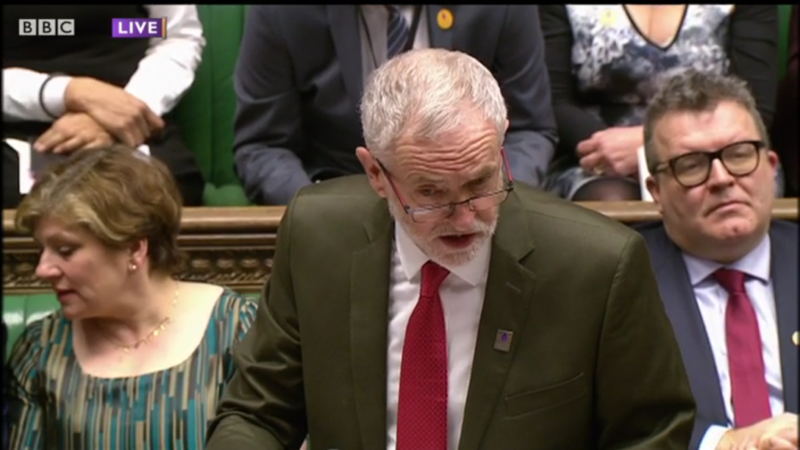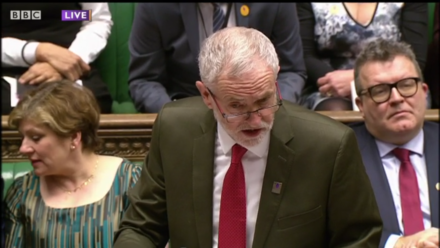

If being leader of the opposition is the toughest job in politics, as is often said, then this is the hardest day in the toughest job.
For traditional Westminster leaders this might be a big problem but, as we all know, Jeremy Corbyn likes to buck convention.
So when he stood up to deliver a response to Philip Hammond’s first Budget we didn’t expect a rat-a-tat-tat style attack.
The Labour leader did it in his own way: serious and substantial but sometimes sprawling with a few big lines that seemed to get lost in the thicket rather than landed with precision.
At the centre of Hammond’s big day was the £2bn extra for social care services in England, as well as support for companies hit by business rate rises, and a hike in national insurance bills for the self-employed.
There was no Brexit bombshell – but the threat of one has not gone away.
Instead Corbyn branded the chancellor’s address “a Budget of utter complacency about the state of our economy”.
He was right, of course, but Hammond had enough of a story to tell about steady progress after the Brexit vote that it made it hard for Labour to develop its argument today.
Spreadsheet Phil coughed up the cash for social care – or some of it – and came close to admitting the immense pressure on the system when he said the money would allow councils to “act now to commission new care packages”.
Hundreds of thousands of elderly people need greater funding for their care but Labour must send the message that todays; payment will not solve the problems which have been stored up by seven years of Tory neglect.
Corbyn stuck to his core lines to pain a picture of a nation fraying under the pressure of Tory indifference and under-investment.
The chancellor boasted about a “strong economy” but his plan is not working for the NHS, schools or the police, cried Corbyn. And there is the “reckless threat” to turn post-Brexit Britain into a tax haven.
The Labour leader worked himself into a state of anger momentarily and he certainly has more of an impact when he lingers on the injustices that fire his soul.
Last night 4,000 people slept rough in Britain, Corbyn pointed out, with justifiable anger. “Do you all remember the ‘long-term economic plan’?”, he asked.
He had the analysis of what has gone wrong under David Cameron and George Osborne, then Theresa May and Hammond, but as is often the case he didn’t quite have the zinger for the evening news that would sum up Labour’s argument in a single sentence.
He did have a few one-liners, including a salient point that “in reality, we all pay for low pay”, but this was not a Budget dominated by poor wages – although one could argue it should have been.
Corbyn spent longer highlighting the related problem of irregular work and attacked the government over the “criss in job security”. Quite right – but the problem is that these types of lines can bounce back at him. Tory MPs started grinning and pointing when, days after a controversy over his tax return, he referred to people who don’t know their level of income week to week.
It is the lot of the opposition leader on Budget day that your best policies will have been pinched weeks beforehand – as was sometimes the case with Ed M – while several of the rest will come under attack from a chancellor armed with a mixture of mockery and money.
Corbyn got through the day ok and, with McDonnell, immediately came out against Hammond’s decision to raise national insurance for the self-employed.
The shadow chancellor called it a “£2bn Tory tax on self-employed low and middle earners” and that, surely, will be thrust of Labour’s argument over the coming week.
It was not a bad day for Labour and it didn’t sound like a particularly good day for Hammond either, despite a few decent jokes. Even The Telegraph took a gloomy initial view of the new chancellor’s biggest day at the despatch box, complaining about the “victimising” of the self-employed and the “unimpressed” reaction from brewers to his plan to soften the impact of business rate hikes on pubs. The last point was, you might say, a half measure.
What is clear is the unpopular plan to ratchet up national insurance rates for the self-employed gives Labour something to go on in the coming days. This is already looking like a traditional Tory Budget mis-step but, on a day of few surprises, the strategy of May and Hammond is obvious: a steady-as-you-go approach that neither inspires nor offends.
Labour has some way to go but Corbyn can, and will, continue campaigning against a Tory economic plan that neglects the working people it claims to serve.




More from LabourList
‘Council Tax shouldn’t punish those who have the least or those we owe the most’
Two-thirds of Labour members say government has made too many policy U-turns, poll reveals
‘Two states, one future: five steps on the path to peace for Israelis and Palestinians’